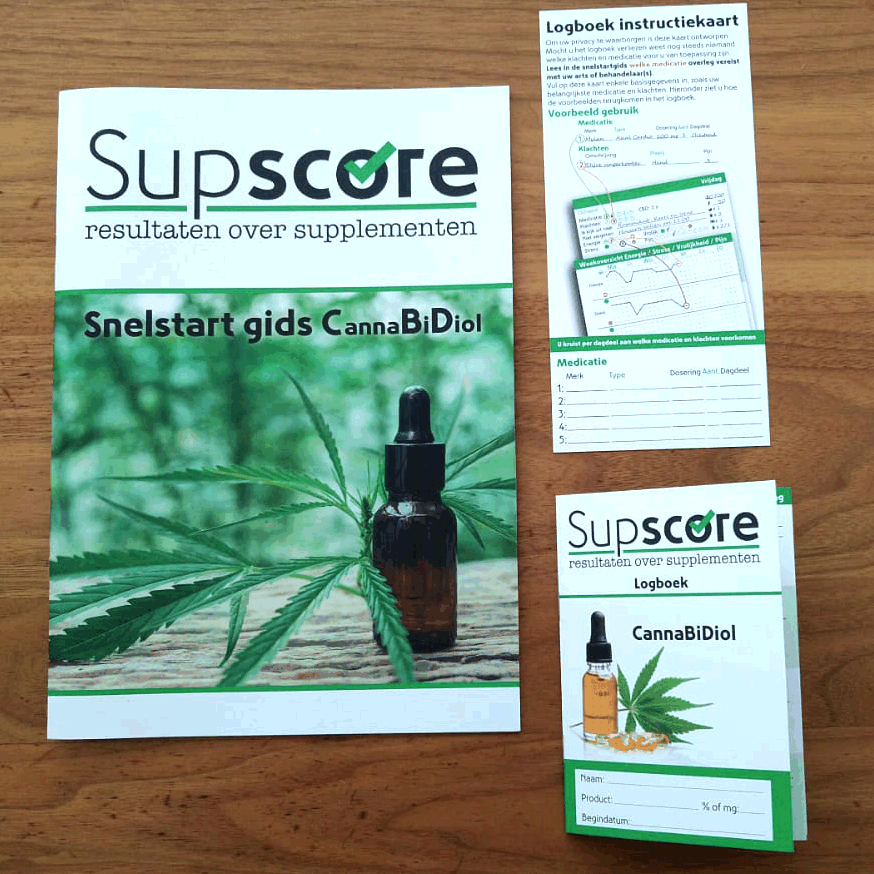Cannabidiol (CBD) is a working compound found in the cannabis plant. From about 2012 and on, this product category has gained a lot of attention. A multitude of applications is mentioned to this ingredient. Unfortunately, for some people CBD has some negative effects. And, last but not least, there are is an unhappy few for whom Cannabis compounds have little to no effects.

Supscore developed a method, consisting of a concise quick-start guide in combination with a logbook. You read the quick-start guide, determine the right product type for you and register what happens to you.
By learning how your body reacts to the product, starting with a low dosage, you will experience what works (and what does not) in your situation.
You should know that in some countries, CBD is sold as medication, prescription based. Supscore would like to underline the fact that in The Netherlands CBD is sold as a food supplement. This means that no medical claims may be stated without scientific evidence.
Supscore does not make any medical claim regarding the application of CBD.
You will not find an overview about the ailments relieved or otherwise affected by Cannabidiol.
On the other hand, you are invited to review (meta) research results as found by scientists and medical professionals, read about how others experience CBD usage at Dutch retailers and pharmacies, and visit Stichting Mediwiet and watch their videos in which the public states how they apply CBD.
How does CBD work?
Please watch this short introductionary video (2:42) about the system in your body that works with CBD. The endocannabinoid system works with cannabinoids and other active compounds.
Safety and warnings
Safety of CBD
CBD is currently classified in the EU in a special way. The WHO (World Health Organisation) decided at the end of 2017 to remove CBD of List I. This list enumerates all hard drugs and active compounds which are addictive. The WHO Expert Committee on Drug Dependence concluded that “in its pure state, cannabidiol does not appear to have abuse potential or cause harm.”
In a peculiar move, the EFSA (European Food and Safety Agency) tightened control on CBD by designating the status ‘Novel Food’ for products with added CBD from early 2019. A lot of discussion erupted on this decision. With this status, it is impossible to bring products to the European market where CBD is added as an ingredient.
In the latest positioning (October 2019) EFSA still uses the ‘Novel Food’ status for CBD, however delegated regulation and law making to the member states in the EU. That means, each individual country must decide whether products with CBD occurring naturally, CBD itself or CBD infused products are allowed.
The strangeness in the situation is that:
- Whole plant products and their respective yield (seeds, fibres, oil) originating from hemp are allowed
- Mixing whole plant products is allowed
- Extracting (removing) CBD is not allowed
- Adding CBD is not allowed
- Other cannabinoids (including the precursor(!) compound CBDA) are considered ‘Novel Food’
Supscore has its doubts whether the current guideline and Novel Food status assigned will hold when tried in court. Even more so whilst at the discovery in early 2019 that THC (delta-9 TetraHydroCannabinol) and other cannabinoids can be created from yeast. As yeast is not a plant, would these compounds be allowed to be added to products? Currently only plant-derived compounds are considered ‘Novel Food’. There is much work to do in the EU before this is sorted out…
In the Netherlands, the NVWA (Dutch food and consumer product safety authority) decides on the regulations. At their website, little is to be found when searching for ‘Cannabidiol’ and CBD except for the ‘Convention of Biological Diversity’ acronym which is unrelated to Cannabidiol.
Warnings
In specific situations whilst taking strong medication it is necessary to be cautious (link to site in Dutch) when applying CBD.
You must discuss with your General Practitioner, Specialist and/or Pharmacist about starting with CBD in the following cases:
- some pain killers,
- blood thinning agents,
- heart rhythm medication,
- blood pressure medication,
- blood sugar or diabetes medication,
- medicine that impacts the immune system (transplantation related medicines, HIV suppressants)
With this list Supscore wants to educate you, warn you and nudge you. The nudge is towards your professional caretakers which might not be accustomed to working with CBD or Cannabis in general. It is very beneficial when you, the public, ask your professionals about how CBD can take a role as a supplementary part in treating your ailment. Talk about it, explain for which goal you would like to apply CBD.
For general practitioners, healthcare professionals, caretakers, specialists or pharmacists, do not be shy. Ask us about CBD if you need more information.
Starting with CBD, safely, with the quick-start guide
The Supscore quick-start guide for CBD is developed with the novice, unknowing consumer of Cannabidiol in mind. The more experienced consumer will appreciate the refreshment in content. You will learn about the method presented by Supscore and techniques to apply. Together they form a responsible way on how to use Cannabidiol on a daily basis. For people with strong prescription medicine, please use and read the guide together with your specialists.
What are the contents of the quick-start guide?
After reading the Supscore quick-start guide on CBD you will know:
- What is Cannabidiol (CBD)?
- What to do and what not to do before consuming CBD
- In what ways CBD can be consumed
- How to choose the best fitting CBD product for your needs
- How to consume CBD responsibly
- What limitations are known Welke belemmeringen er zijn voor gebruik
- What risks can be identified with consuming CBD
The quick-start guide is a structured document that covers the most important topics. It is written in a concise way for your preference. Elaborate sources are listed below.
